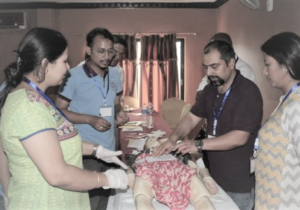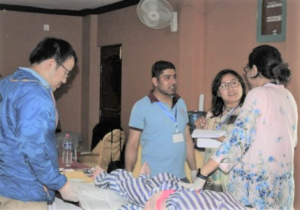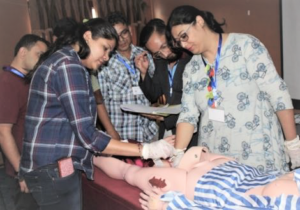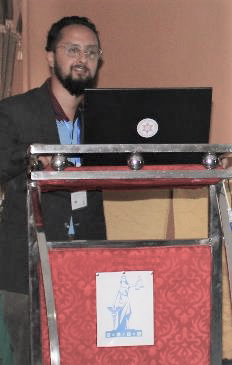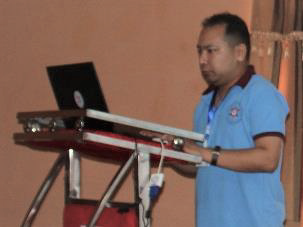Medico-Legal Society of Nepal conducted a three-day Clinical Forensic Training for developing competency and ensuring uniformity in medico-legal examination and reporting in cases of alleged sexual assault and other forms of gender-based violence. Similarly, recent changes in law have required the development of standards and protocols for forensic estimation of age..
 Chief Guest Prof. BM Nagpal lighting the lamp during opening ceremony
Chief Guest Prof. BM Nagpal lighting the lamp during opening ceremony
The event started with an opening ceremony chaired by Dr. Rijen Shrestha, President – MeLeSoN, Prof. BM Nagpal, Dean – Manipal College of Medical Sciences as chief-guest, with SSP Hari Raj Wagle, Gandaki State Police Office, Dr. Arjun Acharya, Director – Pokhara Academy of Health Sciences, and Adv. Rohitraj Bastola, Chair – High Court Bar Association.
The participants included 24 Forensic Consultants from 15 medical colleges in Nepal.
1. Alok Atreya
2. Sanjay Kumar Shah
3. Srijana Kunwar
4. Archana Chaudhary
5. Malshree Ranjitkar
6. Jenash Acharya
7. Sharmila Gurung
8. Raj Kumar Karki
9. Samjhana Ghimire
10. Sudhir Raman Parajuli
11. Santosh Koirala
12. Tej Prakash Chataut
13. Madan Prasad Baral
14. Rijen Shrestha
15. Biplab Manandhar
16. Suraj Sharma
17. Apurba Acharya
18. Manoj Hang Limbu
19. Abhishek Palikhe
20. Jwala Kandel
21. Binamra Bista
22. Prakash Panjiyar
23. Amshu Pradhan
24. Rajesh Kumar Shah
 Group photo including guests of honor, facilitators and participants
Group photo including guests of honor, facilitators and participants
The training was facilitated by Dr. Eugen Dolma Walung, from Maharajgunj Medical Campus, Institute of Medicine, with other facilitators including Dr. Neelu Hirachan and Dr. Nuwadatta Subedi from Gandaki Medical College and Dr. Mani Raj Maharjan, also from Maharajgunj Medical Campus, Institute of Medicine.
Following the opening ceremony, the academic sessions were started, which were divided into two parts – a two days hands-on workshop on Medico-Legal Examination of Survivors of Sexual Assault and other forms of Gender based Violence, and a one day seminar/working group meeting on Forensic Age Estimation in the Living.
Groups working during practical session on History taking from survivor of Sexual violence
The workshop on Medico-Legal Examination of Survivors of Sexual Assault and other forms of Gender based Violence started was conducted by Dr. Eugen Dolma Walung and Dr. Neelu Hirachan.
The academic sessions included:
- Overview of Sexual Violence
- Definition
- Prevalence
- Introduction of Sexual Violence
- Myths, Associated realities and Consequences of Sexual Violence
- Nepalese legal context
- Service provision in Examination of Sexual Violence
- Role of forensic consultants in examination of survivors
- Benefits of medico-legal examination over traditional examination by non-specialists
- International models for provision of service
- Requirements for service deliverance to survivors of sexual assault
- Assessment and Examination
- Relevance of assessment and examination of survivors of sexual assault
- Legal implications of different types of Consent/Assent
- Tips for history-taking
- Differentiation between different conditions mimicking ano-genital injuries
- Specimen Collection
- Needs, importance and some common principles
- Guidelines for collection of forensic specimen.
The second day consisted of practical sessions with group members conducting hands on exercises on dummies for examination and collection of specimen from survivors of sexual assault.
Groups working during practical session on examination and specimen collection from survivor of Sexual violence
The second day also included a session on Overview of Health Sector Initiatives on GBV – OCMC and further by Mr. Sitaram Prasai of National Health Sector Support Programme, where he discussed the development of One-stop Crisis Management Centers in Nepal and their management.
This was followed by a session on sharing of experiences of forensic experts around Nepal, before the day ended with the participants presenting on their cases, including consent, history-taking, examination and specimen collection.
Groups presenting their case reports, including consent, history taking, examination and specimen collection
The last day of the workshop consisted or a seminar and working group meeting of all
participants on Forensic Age Estimation in the Living, with facilitators Dr. Nuwadatta Subedi and Dr. Mani Maharjan.
The seminar and working group meeting was geared towards developing competency amongst
Forensic Experts in estimation of age in living individuals and developing a protocol for estimation of age
based on radiography to ensure uniformity in reporting in cases of age estimation throughout Nepal.
The academic sessions included
- Introduction to Clinical Forensic Age Estimation and its legal implications
- Legal bases for Forensic Age Estimation in the living
- Age Estimation in the living
- Medico-Legal aspect of Age estimation in Nepal
- Competencies required
- Latest developments
- Recent and global approach in Forensic Age Estimation in the living
- Hands-on session on Demirjian’s method of Age Estimation in the living
- Compilation of Standard Protocol for estimation of age in the living using Radiography
- Hands-on session on Report writing in Forensic Age Estimation in the living


Participants working during Hands-on session on Report writing in Forensic Age Estimation in the living



